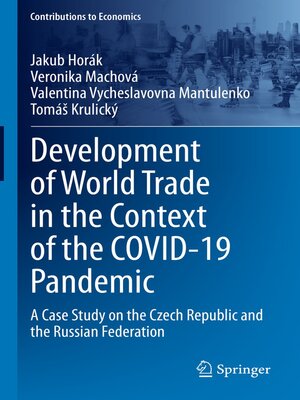Development of World Trade in the Context of the COVID-19 Pandemic
ebook ∣ A Case Study on the Czech Republic and the Russian Federation · Contributions to Economics
By Jakub Horák

Sign up to save your library
With an OverDrive account, you can save your favorite libraries for at-a-glance information about availability. Find out more about OverDrive accounts.
Find this title in Libby, the library reading app by OverDrive.



Search for a digital library with this title
Title found at these libraries:
| Library Name | Distance |
|---|---|
| Loading... |
This book examines the development of world trade during the COVID-19 pandemic, also taking international trade between the Czech Republic and the Russian Federation into account as a case study. Using an advanced method of artificial neural networks, it evaluates a long time series and predicts the development of trade between the two countries.
The book further analyzes the specifications of export items on both sides and the dependence of the Czech Republic on Russia in terms of raw materials, which is not sustainable. It discusses the need for a political and business consensus, as well as a long-term investment plan to address this issue. Finally, it sheds light on the Czech companies actively operating in Russia, especially in the engineering, automotive, energy, and food industry. The book predicts the future bilateral trade relations between the two countries and the expected decrease in the demand on the side of Russian customers.
The book will appeal to students, scholars, and researchers of economics and finance in general, macro- and microeconomics, statistics, and trade analytics in particular, as well as professionals and international trade companies interested in a better understanding of world trade developments and the future trade scenarios between the Czech Republic and Russia.







